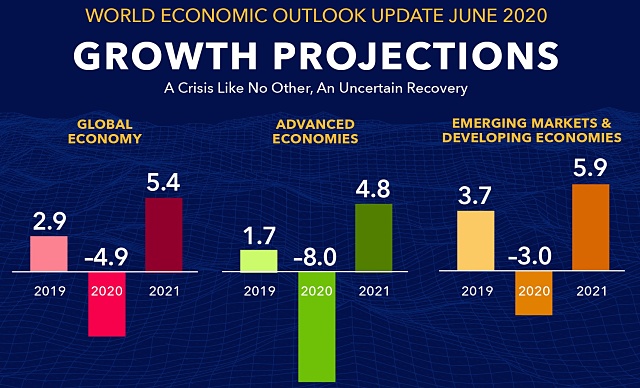IMF predicts deeper global recession despite softer lockdown measures

The IMF expects global GDP to decline 4.9% in 2020 before bouncing back to a 5.4% expansion in 2021.
The International Monetary Fund (IMF) predicts the effects of COVID-19 on the global economy will be worse than feared, while the eventual recovery is expected to be “more gradual than previously forecast”.
In a report titled A Crisis Like No Other, An Uncertain Recovery, published on Wednesday this week, the IMF predicted the global economy would contract by 4.9% this year, significantly worse than the 3% decline expected in its April forecast.
The fund also ruffled the feathers of banks and market speculators by saying that investors were “apparently betting on continued and unprecedented support by central banks”, adding that “markets appear to be expecting a quick V-shaped rebound in activity”.
“This has created a divergence between the pricing of risk in financial markets and economic prospects,” the IMF said, which in other words, portrays the post-March COVID-19 stock market rally as a gamble.
On the bright side, the IMF expects the global economy to bounce back in 2021 and to post a GDP growth rate of 5.4%.
The fund described the COVID-19 impact on low-income households as “adverse” and “acute” while “imperilling the significant progress made in reducing extreme poverty in the world since the 1990s”.
IMF projections suggest a cumulative loss to the global economy of over US$12 trillion (A$17 trillion) between 2020–21 due to COVID-19. However, the fund’s forecast was tempered with a warning that its figures carried a “high degree of uncertainty” with both upside and downside risks to the outlook.
On the upside, the IMF mentioned that vaccine development and additional fiscal support could lead to a quicker recovery. On the downside, further waves of infections could undo all progress made over the past two months and reactivate lockdown procedures that saw spending cut by 90% in some sectors such as travel and retail.
Moreover, fresh spikes in COVID-19 cases could “rapidly tighten financial conditions” and “trigger debt distress”, the IMF said.
Australian economy receives upgrade
Notably, Australia is the only developed nation to see its 2020 growth forecast revised favourably.
Australian GDP is expected to contract by 4.5% this year (a significant improvement over the 6.7% decline first predicted in April) with inflation remaining steady at 1.4%.
With specific advice to recovering economies such as Australia, the IMF recommended that additional government support such as wage subsidies should be unwound with alternative stimulus measures introduced if required.
The IMF said it supports shifting workers into high growth areas and away from “persistently smaller” sectors by incentivising new industries to hire more workers and addressing “labour market rigidities” that stifle both supply and demand.

Elsewhere, the US economy is expected to contract 8% this year while EU-bloc countries are on course for a decline of around 10% while Japanese output will fall by 5.8%.
“COVID-19 pushed economies into a Great Lockdown, which helped contain the virus and save lives, but also triggered the worst recession since the Great Depression,” the agency said.
According to the IMF, “over 75% of countries are now reopening at the same time” while the pandemic intensifies in many developing economies such as Brazil, South Africa, India and parts of Africa.
Most developed countries are currently deploying measures to re-open their economies as part of a collaborative attempt to reset trade. However, in the absence of a medical solution to COVID-19, the strength of the recovery is highly uncertain and the impact on sectors and countries uneven.
Busy with COVID
According to the World Health Organisation, more than 35,000 new COVID-19 cases were reported in the US on Tuesday this week – the highest single-day total since late April and the third-highest total since the start of the pandemic. Several regions have experienced a surge in cases including South America and Africa, thereby delaying a return to full economic activity.
The IMF stated that despite several business sectors returning to work across the US and Europe, social distancing and enhanced workplace safety protocols were “weighing on economic activity”.
Another challenge facing consumers and business owners is the psychological impact of several months of isolation. Although shops, airports, hotels and other retail businesses are gradually re-opening, many consumers remain reticent, risk-averse and preferring to delay discretionary spending on holidays and luxuries until the new year.
As a result of the dislocated and patchy recovery estimates, the IMF declared that it sees a deeper recession in 2020 and a slower recovery in 2021.
“We are definitely not out of the woods. This is a crisis like no other and will have a recovery like no other,” IMF research unit director Gita Gopinath said.
IMF world economic outlook update
Presentation by IMF chief economist Gita Gopinath on the latest outlook for the global economy:
